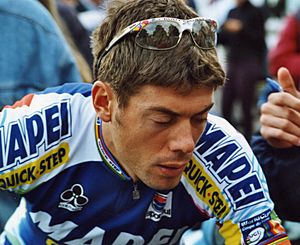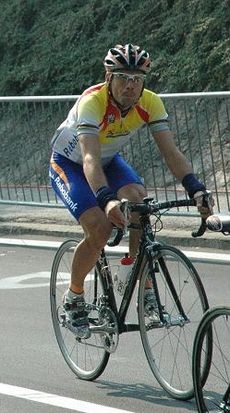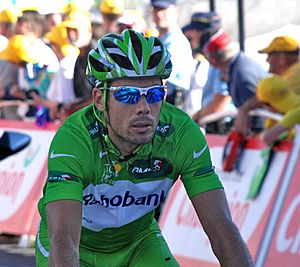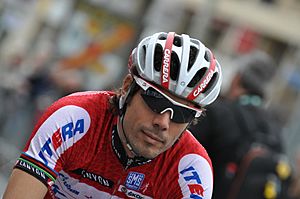Óscar Freire facts for kids
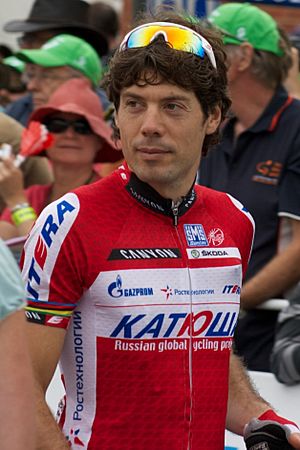
Freire at the 2012 Tour Down Under
|
|||
| Personal information | |||
|---|---|---|---|
| Full name | Óscar Freire Gómez | ||
| Nickname | The Cat, Oscarito | ||
| Born | 15 February 1976 Torrelavega, Spain |
||
| Height | 1.71 m (5 ft 7+1⁄2 in) | ||
| Weight | 64 kg (141 lb; 10 st 1 lb) | ||
| Team information | |||
| Current team | Retired | ||
| Discipline | Road | ||
| Role | Rider | ||
| Rider type | Sprinter, Classics specialist | ||
| Major wins | |||
|
|||
Óscar Freire Gómez (born 15 February 1976) is a Spanish former professional road cyclist. He was one of the best sprinters in his sport. He won the World Championship three times. This amazing achievement puts him in a very small group of cycling legends. Later in his career, he also became known for winning "classic" one-day races.
Freire won the famous Milan–San Remo race three times. He also won the green jersey for points and four stages in the Tour de France. In the Vuelta a España, another major race, he won seven stages. He had a very successful career, even though he was smaller than many other cyclists. He also had a unique training style, riding shorter distances than most pros.
Contents
Óscar Freire's Cycling Journey
Starting Out (1998–1999)
Óscar Freire was born in Torrelavega, Spain. He became a professional cyclist in 1998 with the Vitalicio Seguros team. In his first year, he won one race stage.
In 1999, Freire didn't win much until October. That's when he surprised everyone at the UCI World Championship Road Race in Verona. He was just supposed to help his Spanish teammates. But he ended up winning the race! After his big win, he used his prize money to buy an elevator for his grandmother's apartment.
Joining Mapei (2000–2002)
In 2000, Freire joined the Mapei team, which was one of the best teams around. He used his salary to buy a new home for his family. That year, he won 11 races, including two stages in the Vuelta a España. He also finished third in the World Championship Road Race.
In 2001, he won two more races. Then, he became world champion for the second time at the 2001 UCI Road World Championships – Men's road race in Lisbon. In 2002, he won a stage in the famous Tour de France.
Years with Rabobank (2003–2011)
In 2003, Freire moved to the Rabobank team. In his first year there, he won six races.
The year 2004 was fantastic for him. He won the Milan–San Remo race, a stage in the Vuelta a España, and his third World Championship road race. This third world title was also in Verona, where he won his first.
In early 2005, he won three stages and the overall title at the 2005 Tirreno–Adriatico race. He also won the Brabantse Pijl and other races. However, an injury cut his season short.
In 2006, Freire won the Brabantse Pijl again. He also won two stages in the 2006 Tour de France. He was doing well in the points competition but had to leave the race due to illness. Freire often faced injuries and had to take breaks from racing. He had problems with his back and neck. Later that year, he won the Vattenfall Cyclassics race.
In the 2007 Vuelta a España, he won three stages. In the 2008 Tour, Freire wore the green jersey, which is given to the leader in the points classification. He won stage 14 and the overall points classification.
During the 2009 Tour, Freire was hit by a pellet from a gun during a stage. He was hit in the thigh but still finished the race.
In March 2010, Freire won the 2010 Milan–San Remo for the third time. On October 10, 2010, he became the first Spanish cyclist to win Paris–Tours. He also set a record for the fastest average speed in a classic race.
Before the 2011 UCI Road World Championships, Freire said he might retire if he didn't win the world title. He had been dealing with breathing problems and had surgery. He couldn't race in the 2011 Tour de France and had to leave the 2011 Vuelta a España.
Final Season (2012)
Freire had planned to retire by 2012. But he changed his mind and joined Team Katusha for his final season. He chose this team because it had other Spanish riders and was well-organized.
In 2012, Freire felt much better and had some great results. He won a stage in the 2012 Tour Down Under in Australia and another stage in the 2012 Vuelta a Andalucía in Spain. In the spring classic races, he finished 7th at Milan–San Remo. He also took second place at E3 Harelbeke and the Brabantse Pijl. He finished 4th in the Amstel Gold Race.
Freire retired from professional cycling at the end of 2012. He moved to Switzerland with his family.
Family Life
Óscar Freire's son, Marcos Freire, is also a professional cyclist.
Major Achievements
Óscar Freire had a remarkable career with many important wins. Here are some of his biggest achievements:
- World Champion: He won the Road Race World Championship three times (1999, 2001, 2004).
- Milan–San Remo: He won this famous one-day race three times (2004, 2007, 2010).
- Tour de France: He won 4 stages and the green jersey (points classification) in 2008.
- Vuelta a España: He won 7 stages in this major Spanish race.
- Other Big Wins: He also won races like Tirreno–Adriatico (overall in 2005), Gent–Wevelgem (2008), Vattenfall Cyclassics (2006), Paris–Tours (2010), and Brabantse Pijl three times (2005, 2006, 2007).
See also
 In Spanish: Óscar Freire para niños
In Spanish: Óscar Freire para niños
 | Lonnie Johnson |
 | Granville Woods |
 | Lewis Howard Latimer |
 | James West |


